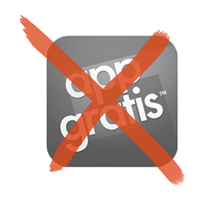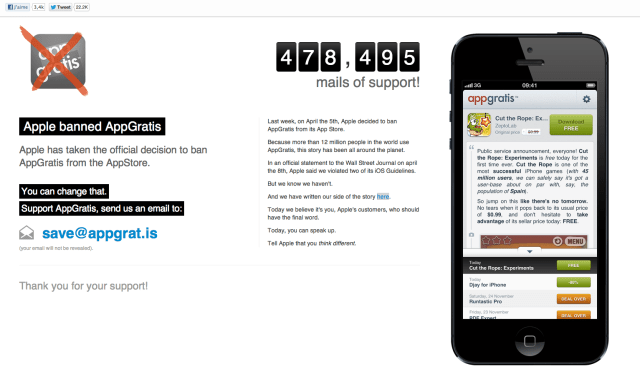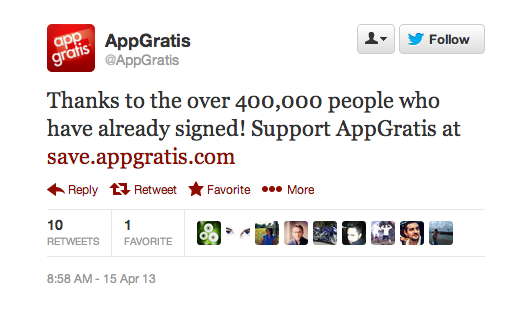AppGratis, the French app promotion and discovery platform startup that was recently ejected from the App Store on the grounds that it violates Apple’s developer T&Cs, is protesting the ban by petitioning its users to send supportive emails on its behalf. The petition, spotted earlier by PocketGamer, has apparently garnered close to half a million emails so far (and 23k tweets*) — which, considering AppGratis has some 12 million users of its app to rally to its cause, doesn’t seem hugely surprising. Especially as generating ‘bursts’ of action from its users is exactly what AppGratis has made a business out of doing thus far.
The platform has apparently been selling its ability to drive titles up the App Store rankings, taking payments from developers to promote their apps — and arguably therefore ‘gaming the App Store charts’ — which is evidently why it has fallen foul of Apple’s T&Cs. Apple tweaked its developer guidelines last September, adding a clause that states: “Apps that display Apps other than your own for purchase or promotion in a manner similar to or confusing with the App Store will be rejected.”
AppGratis has confirmed that Apple banned it for violating this clause. Its use of push notifications for advertising promotions/direct marketing purposes has also got it in trouble with Cupertino — specifically, Apple said it broke another App Store clause which states: “Apps cannot use Push Notifications to send advertising, promotions, or direct marketing of any kind.”
Reading between the lines, Apple appears unhappy that AppGratis’ behaviour was distorting and undermining merit-based App Store rankings. Last week AllthingsD cited sources close to Apple who said it was troubled that AppGratis’ business model appeared to favor developers who have the financial means to pay for exposure. “The App Store is intended as a meritocracy,” a source familiar with Apple’s thinking was quoted as saying.
From the outside looking in, AppGratis’ violation of the App Store T&Cs seems pretty clear — although there is some blurring of the line between app discovery and app promotion. The main component of Apple’s actions that could be questioned here is why it took so long to clamp down on what AppGratis was doing, having previously allowed it to operate. Perhaps Cupertino was monitoring it to see how the business evolved.
We’ve contacted AppGratis with questions and requests for comment. We’ll update this story with any response. Update: See below for responses from AppGratis’ CEO. At the time of writing, Apple — also contacted for comment — has not yet responded.
Last week AppGratis CEO Simon Dawlat posted a very long-winded blog about how the ban is unfair, which you can read in full here. The gist of which appears to be that ‘Apple used to be ok with us, but now it’s banning us’. Dawlat’s explanation does not, however, make any mention of paid promotions being part of AppGratis’ business model.
Soliciting payments from developers in exchange for high App Store rankings is something AppGratis has done, according to Conor O’Connor, CEO of discount hotel app Hot.co.uk. He told TechCrunch that, after noticing his app was being beaten by “some really low quality Apps” in the App Store rankings, he contacted AppGratis in April 2012. “I started to investigate. This lead me to talk directly to Simon Dawlat, CEO of App Gratis, where I was promised the number one position in Spain for 2€ per download and a minimum spend of 45,000€,” said O’Connor.
“I was hesitant as I was unsure if all of their downloads were legitimate. I asked repeatedly if they were using automated download mechanisms which he denied.” (Note: Sentence removed for legal reasons.)
Commenting more broadly on the issue of paid app promotions and whether he thinks the app store ban for AppGratis is justified, O’Connor added: “I don’t want to see any startup fail and 45 people lose their jobs but it shouldn’t be possible to just buy your way to the top of app store rankings. It should be the best apps win not just the better financed. I think what Apple did is overall a good thing for developer and start up ecosystems.”
Hot.co.uk told TechCrunch it was also contacted in late September 2012 by another sales person from AppGratis — “offering 15,000 downloads for 1.2€ each”.
We’ve put O’Connor’s comments to Dawlat and will update this story with any response from him or AppGratis. Update: Dawlat has sent an initial response via email, denying the company has used “any shady and/or incentivized tactics to grow our userbase”, saying: “We have clearly stated that we have never used any shady and/or incentivized tactics to grow our userbase. NEVER. NEVER. NEVER.”
We’ll update this story with further comment from AppGratis as we get it. See: Update 2.
As you might expect, France’s digital industry minister Fleur Pellerin has spoken up in support of AppGratis, describing Apple’s actions as “extremely brutal”, unilateral and “without explanation”, and calling on Cupertino to “behave ethically“.
Update 2: Here’s Dawlat’s response in full — which rebuts criticisms of the paid promotion model by saying the business focuses on editorial app picks to find “gems”, coupled with discounts it has negotiated with app publishers and that its sponsored app slots, sold on a cost-per-install basis, are a “market standard”:
At the core of the AppGratis App Discovery experience is a continuous stream of editorial picks.
Our team of 20+ publishers does the hard job of scouting the App Store, unveiling the gems, and featuring them along with two important things:
1. High quality editorial copy to enrich the product experience.2. Cool discounts our team has been negotiated — such paid-to-free Apps, freemium Apps with in-app promotions, or simply a discounted paid App.
This makes for an exceptionally compelling, simple and efficient App Discovery experience that has attracted 12 million users in the world.To make this stream of editorial picks happen, we work with thousands of app developers around the world and we feature their app for free.
Please read this post for an example of what I’m saying:
Then for advertisers, we offer sponsored slots that are being displayed within our regular stream of editorial picks.
These advertising campaigns are clearly label “Sponsored”.
They are sold on a “CPI” Cost-per-install basis, which is the market standard used by Facebook Mobile Ads and all the other big players.
We have a strict quality policy with these advertisers (we only work with advertisers that have apps relevant to our audience).
And we obviously observe restricted quota of sponsored slots, otherwise we would have never been able to attract and keep such a wide community of users.
Last but not least, everything is 100% NON-incentivized, so if an App we feature isn’t good – paid or not – it just won’t fly.
It’s important that you remember we started and have always been a consumer service since 2008.
That was years before there was an actual advertising market, and by evolving our model along the years, we have been able to build a model around high-level curation that actually helps everybody: users, indies and mobile brands, while enabling us to build a sustainable business that employs 45 people and has recently attracted $13,5M in venture capital.
Also, we have asked for the support of our community so please make sure you check out this link
Asked whether AppGratis solicits payments from developers in exchange for reaching the number one slot in a particular country’s app store, Dawlat said the number of installs required to achieve a top slot is well known to mobile media buyers but denied that AppGratis’ business is about selling positioning in an App Store. Rather, he said, the focus is on app discovery:
Mobile media buyers know exactly what # of installs they need to reach the top of any App Store in the world.
Since the App Store algorithm has been based on download velocity only for so long, advertisers know exactly what they are doing. Reaching the the top of any App Store is a simple and logical equation.
But we’re not in this business.
We’re in in the business of helping the end users discover new apps, and to serve this mission, we’re playing the long run. We’re building a community. We’ve never been in the business of gaming the top charts or anything. This is a very strong statement from us.
A strong statement it may be — but it’s also a statement that Apple evidently disagrees with.
Here’s a screengrab of AppGratis’ user petition page:
* At the time of writing, AppGratis’ first tweet about the petition (via its own Twitter account) had received just 10 retweets, at least two of which were by AppGratis employees:


